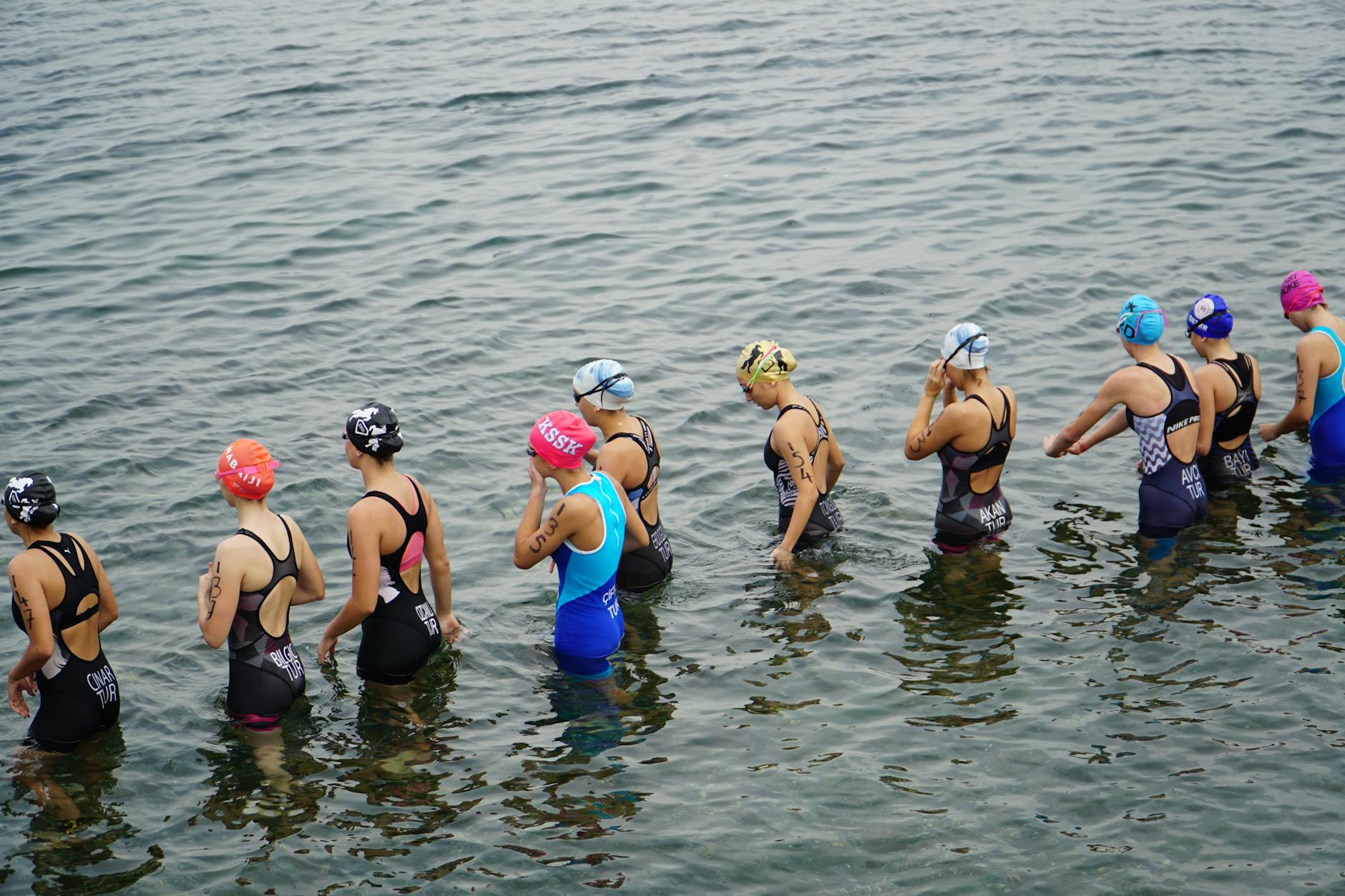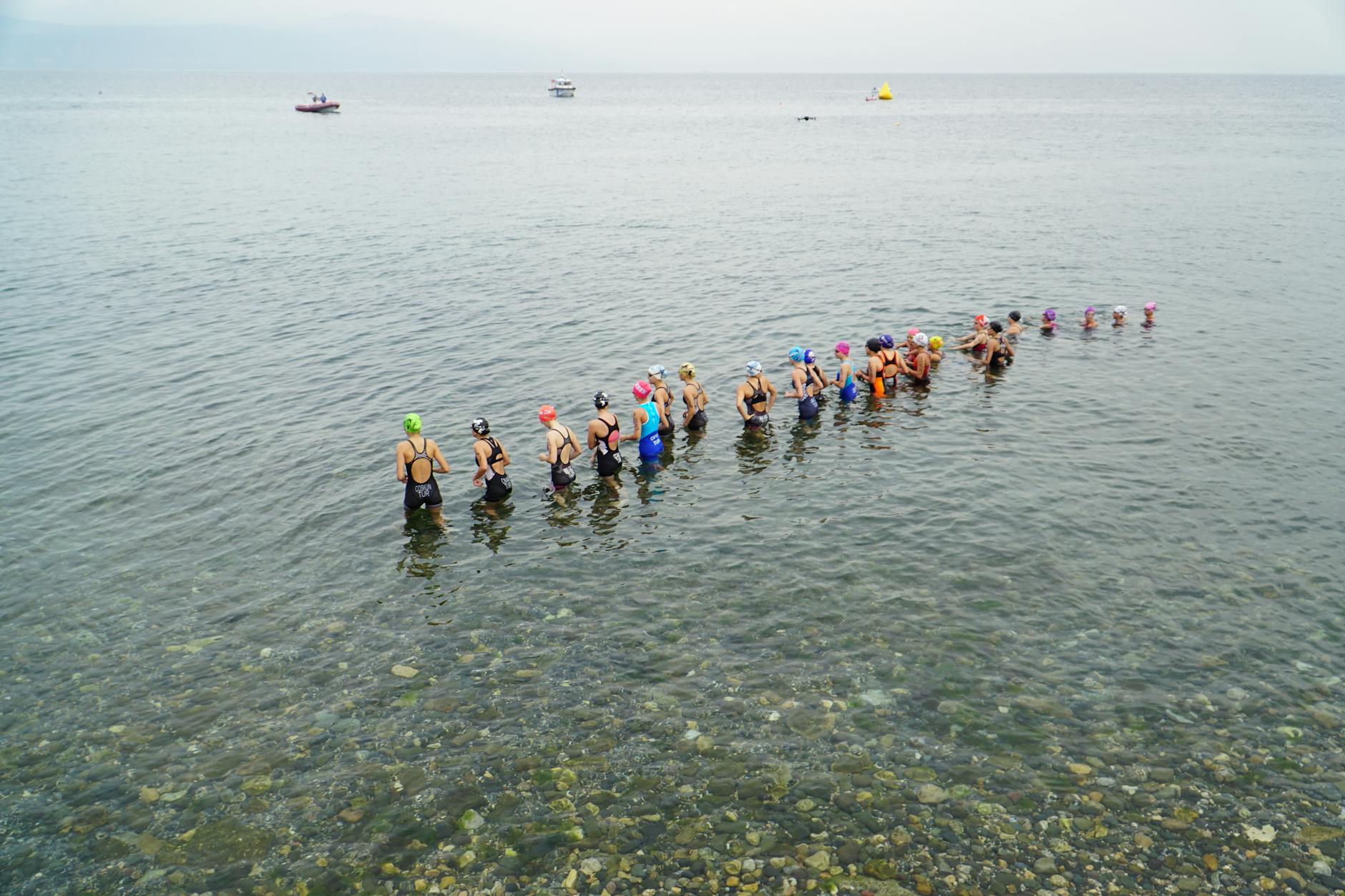First Triathlon Nerves? Master Your Mind With These Expert Tips Have you been training all summer to tackle your first triathlon bar the doubts and nervousness of race day? 😰 You’re not alone! It is a tough multi-sport eventthat even the best of athletes still get butterflies before entering this game. That being said, the good news is: If you prepare in advance mentally for those nerves they can absolutely be converted into unstoppable momentum. The Ultimate Guide to First Time Triathlon-independent
Now envisage yourself at the beginning, full of self-assurance and optimism about what is to come. And that is the power of a ready mind. Read on as we dissect some of the most efficient methods that you can employ to eliminate first triathlon nerves and reach your goals. This bit goes all the way from knowing why you are afraid of something to building a resolute and positive mindset that will take your across the finish line with a smile on your face.
Learn how to finally start training with unwavering confidence, date-race day nerves like a pro and overcome triathlon fears. We will also delve into post-race mental tactics so that you can internalize your achievement and line up for the next successful performance. This is where you put on your running shoes and start the journey of developing mental toughness that will serve you long beyond just your first triathlon! Conquering the Inevitable First-Tri Jitters
Understanding Triathlon Anxiety
As you embark on your first triathlon journey, it’s natural to experience a mix of excitement and apprehension. Understanding triathlon anxiety is the first crucial step in overcoming it. Let’s dive into the common fears, physical symptoms, and psychology behind pre-race jitters to help you better prepare for your big day. Overcoming First-Time Triathlon Jitters
How should a beginner start a triathlon?
Common Fears for First-Time Triathletes
First-time triathletes often face a unique set of fears that can contribute to pre-race anxiety. Recognizing these concerns is essential for addressing them effectively:
- Open Water Swimming: Many novice triathletes worry about swimming in open water, especially if they’re used to pool training.
- Equipment Malfunctions: Concerns about bike mechanical issues or forgetting essential gear are common.
- Transitions: The fear of fumbling during transitions or forgetting the correct order of tasks can be overwhelming.
- Endurance Concerns: Doubts about completing all three disciplines consecutively often plague first-timers.
- Being Last: The fear of finishing last or not meeting cutoff times is a significant concern for many. Overcoming First-Time Triathlon Jitters
To better understand these fears, let’s look at a comparison of common triathlon fears and their potential solutions:
| Common Fear | Potential Solution |
|---|---|
| Open Water Swimming | Practice in open water before race day, use a wetsuit for buoyancy |
| Equipment Malfunctions | Learn basic bike maintenance, double-check gear list |
| Transition Struggles | Practice transitions during training, create a mental checklist |
| Endurance Worries | Follow a structured training plan, practice brick workouts |
| Finishing Last | Focus on personal goals, remember that finishing is an achievement |
By identifying and addressing these fears head-on, you can significantly reduce your pre-race anxiety and boost your confidence.
First Triathlon Nerves? Master Your Mind With These Expert Tips
Recognizing Physical Symptoms of Anxiety
Triathlon anxiety isn’t just a mental state; it often manifests in physical symptoms. Being aware of these signs can help you recognize and manage your anxiety more effectively: Overcoming First-Time Triathlon Jitters
- Increased Heart Rate: Your heart may race or pound, even when you’re not exercising.
- Gastrointestinal Distress: Anxiety can cause stomach upset, nausea, or diarrhea.
- Muscle Tension: You might experience tightness in your shoulders, neck, or jaw.
- Sleep Disturbances: Difficulty falling asleep or staying asleep is common before a race.
- Sweating: Excessive sweating, especially on your palms or feet, can occur.
- Trembling: You may notice slight tremors in your hands or legs.
- Shortness of Breath: Anxiety can lead to rapid, shallow breathing.
Recognizing these symptoms is crucial because they can often be mistaken for physical readiness issues. By understanding that these are manifestations of anxiety, you can take steps to address them through relaxation techniques and mental preparation strategies.
The Psychology Behind Pre-Race Jitters
Understanding the psychological factors contributing to pre-race anxiety can help you develop effective coping strategies. Several key psychological concepts come into play:
- Fear of the Unknown: As a first-time triathlete, much of your anxiety stems from uncertainty about what to expect. This fear of the unknown is a natural human response to new situations.
- Performance Anxiety: The pressure to perform well, especially if you’ve shared your triathlon goals with others, can contribute significantly to pre-race jitters.
- Impostor Syndrome: Many first-time triathletes feel like they don’t belong or aren’t “real” triathletes, leading to anxiety and self-doubt.
- Catastrophic Thinking: The tendency to imagine worst-case scenarios can amplify anxiety and negatively impact performance.
- Perfectionism: Striving for perfection in your first triathlon can create unrealistic expectations and increase stress levels.
To address these psychological factors, consider the following strategies: Overcoming First-Time Triathlon Jitters
- Visualization: Mentally rehearse each stage of the race to familiarize yourself with the process and reduce uncertainty.
- Positive Self-Talk: Replace negative thoughts with positive affirmations to boost confidence and reduce anxiety.
- Goal Setting: Set realistic, achievable goals for your first triathlon to manage expectations and reduce performance pressure.
- Mindfulness: Practice mindfulness techniques to stay present and avoid catastrophic thinking.
- Community Engagement: Connect with other triathletes to share experiences and realize that your feelings are normal and shared by others.
Understanding the psychology behind your pre-race jitters can empower you to take control of your mental state and approach your first triathlon with greater confidence and composure.
As you delve deeper into your triathlon preparation, remember that anxiety is a normal part of the process. By recognizing common fears, understanding physical symptoms, and addressing the underlying psychology, you’re taking significant steps towards mental preparedness. This knowledge forms the foundation for developing effective strategies to manage your anxiety and build a positive mindset for race day. Overcoming First-Time Triathlon Jitters
Now that we’ve explored the various aspects of triathlon anxiety, let’s move on to developing a positive mindset that will carry you through your training and race day experience.
First Triathlon Nerves? Master Your Mind With These Expert Tips
Developing a Positive Mindset
Now that we’ve explored the nature of triathlon anxiety, let’s focus on developing a positive mindset to conquer those first-time jitters. A strong mental foundation is crucial for success in any triathlon, especially for beginners.
Setting realistic expectations
First-time triathletes often set unrealistic goals, which can lead to unnecessary stress. Instead, focus on completing the race and enjoying the experience. Consider the following table to help set achievable targets:
| Experience Level | Primary Goal | Secondary Goal |
|---|---|---|
| First-time | Finish the race | Have fun |
| Beginner | Improve on training times | Finish strong |
| Intermediate | Set a personal best | Place in age group |
Visualizing success
Visualization is a powerful tool for mental preparation. Spend time each day imagining yourself: Overcoming First-Time Triathlon Jitters
- Confidently navigating the swim course
- Smoothly transitioning between disciplines
- Crossing the finish line with a sense of accomplishment
Practicing positive self-talk
Your inner dialogue significantly impacts your performance. Replace negative thoughts with positive affirmations:
- “I am well-prepared for this challenge”
- “Each stroke and step brings me closer to my goal”
- “I am strong, capable, and resilient”
Embracing the challenge
Reframe the triathlon as an exciting opportunity rather than a daunting task. Focus on:
- Personal growth and self-discovery
- The unique experiences each discipline offers
- The supportive triathlon community you’re joining
By developing a positive mindset, you’ll not only manage pre-race anxiety but also enhance your overall triathlon experience. Next, we’ll explore specific pre-race mental preparation strategies to further boost your confidence.
Pre-Race Mental Preparation Strategies
Now that we’ve covered developing a positive mindset, let’s explore essential pre-race mental preparation strategies to help you overcome those first-time triathlon jitters.
A. Creating a race-day routine
Establishing a consistent race-day routine can significantly reduce anxiety and boost confidence. Here’s a sample routine to consider: Overcoming First-Time Triathlon Jitters
- Wake up early
- Eat a familiar breakfast
- Double-check gear
- Arrive at the venue with ample time
- Warm-up and stretch
B. Meditation and mindfulness techniques
Incorporating meditation and mindfulness into your pre-race preparation can calm your nerves and improve focus. Try this simple technique:
- Find a quiet spot
- Sit comfortably
- Focus on your breath
- Observe thoughts without judgment
- Practice for 5-10 minutes daily
C. Progressive muscle relaxation
This technique helps release physical tension and promotes mental calmness:
| Body Part | Action |
|---|---|
| Hands | Clench and release |
| Arms | Flex and relax |
| Shoulders | Shrug and drop |
| Face | Scrunch and smooth |
| Legs | Tense and loosen |
D. Breathing exercises for calm
Deep breathing exercises can quickly reduce anxiety and center your mind:
- Inhale deeply through your nose for 4 counts
- Hold your breath for 4 counts
- Exhale slowly through your mouth for 6 counts
- Repeat 5-10 times
By implementing these pre-race mental preparation strategies, you’ll be better equipped to manage triathlon anxiety and approach your first race with confidence. Next, we’ll explore how to build confidence through training, further strengthening your mental resilience.
First Triathlon Nerves? Master Your Mind With These Expert Tips
Building Confidence Through Training
As we delve into the importance of building confidence through training, it’s crucial to understand how proper preparation can significantly reduce race-day anxiety. Let’s explore effective strategies to boost your self-assurance as a first-time triathlete.
A. Mastering each discipline
To build confidence, focus on mastering each discipline of the triathlon:
- Swimming: Practice open-water swimming and sighting techniques
- Cycling: Improve endurance and practice gear shifting
- Running: Work on pacing and transitioning from cycling
| Discipline | Key Focus Areas | Confidence-Building Exercises |
|---|---|---|
| Swimming | Open-water skills, sighting | Pool drills, open-water practice swims |
| Cycling | Endurance, gear shifting | Long rides, hill climbs, brick workouts |
| Running | Pacing, transitions | Tempo runs, post-ride runs |
B. Simulating race conditions
Recreate race-day scenarios during training to familiarize yourself with potential challenges:
- Practice transitions between disciplines
- Train in various weather conditions
- Wear your race-day gear during workouts
C. Tracking progress and celebrating milestones
Monitor your improvements to boost motivation and confidence:
- Keep a training log to record progress
- Set achievable goals for each discipline
- Celebrate small victories along the way
By focusing on these aspects of training, you’ll build the confidence needed to tackle your first triathlon. Next, we’ll explore effective strategies for managing race-day stress to ensure you’re mentally prepared for the big event.
Managing Race-Day Stress
As you approach the big day, it’s crucial to have strategies in place to manage race-day stress. Here are some effective techniques to help you stay calm and focused:
A. Arriving early and familiarizing with the venue
Arriving at the venue well before the race starts allows you to:
- Locate key areas (transition zones, start/finish lines)
- Check-in and set up your equipment without rushing
- Mentally rehearse your race plan
B. Focusing on controllable factors
Concentrate on elements within your control to reduce anxiety:
| Controllable Factors | Uncontrollable Factors |
|---|---|
| Your equipment | Weather conditions |
| Nutrition plan | Other competitors |
| Race strategy | Course changes |
| Mental preparation | Unexpected delays |
C. Using distraction techniques
Employ these methods to keep pre-race nerves at bay:
- Deep breathing exercises
- Visualization of a successful race
- Listening to calming music
- Light stretching or warm-up routines
D. Connecting with fellow competitors
Interacting with other triathletes can:
- Provide a sense of camaraderie
- Offer opportunities to share experiences and tips
- Help normalize pre-race jitters
Remember, some level of nervousness is normal and can even be beneficial. Channel this energy into positive focus and determination. By implementing these strategies, you’ll be better equipped to handle race-day stress and enjoy your triathlon experience.
First Triathlon Nerves? Master Your Mind With These Expert Tips
Overcoming Specific Triathlon Fears
Now that we’ve explored general mental preparation strategies, let’s dive into overcoming specific triathlon fears that many first-timers face.
A. Conquering open water swim anxiety
Open water swimming can be intimidating, but with proper preparation, you can overcome this fear:
- Practice in open water before race day
- Familiarize yourself with your wetsuit
- Start at the back or side of the pack to avoid crowding
- Focus on your breathing and stroke technique
B. Dealing with transition area stress
The transition area can be chaotic, but these tips can help you stay calm:
- Practice transitions during training
- Organize your gear the night before
- Visualize your transition process
- Arrive early to set up and familiarize yourself with the area
C. Pacing strategies for the run
The run can be challenging after swimming and cycling. Here’s how to manage it:
| Strategy | Description |
|---|---|
| Start slow | Begin at a comfortable pace to avoid burnout |
| Use landmarks | Break the course into segments for mental management |
| Positive self-talk | Encourage yourself throughout the run |
| Focus on form | Maintain good running posture to conserve energy |
Remember, these fears are common among first-time triathletes. By addressing them head-on and implementing these strategies, you’ll build confidence and improve your overall race experience. In the next section, we’ll explore post-race mental strategies to help you reflect on your accomplishment and prepare for future events.
Post-Race Mental Strategies
Now that you’ve completed your first triathlon, it’s time to focus on post-race mental strategies to help you grow as an athlete and prepare for future challenges.
First Triathlon Nerves? Master Your Mind With These Expert Tips
Reflecting on the Experience
Take time to mentally revisit your race, focusing on both the highs and lows. Consider creating a race journal to document your thoughts and emotions. This reflection process helps solidify the lessons learned and provides valuable insights for future races.
| Reflection Points | Questions to Ask Yourself |
|---|---|
| Achievements | What went well during the race? |
| Challenges | What obstacles did you face? |
| Emotions | How did you feel at different stages? |
| Surprises | What unexpected situations arose? |
Learning from Challenges
Identify areas for improvement and view them as opportunities for growth. Analyze each segment of the triathlon to pinpoint specific challenges:
- Swim: Did you struggle with open water anxiety?
- Bike: Were there issues with pacing or nutrition?
- Run: How did you manage fatigue in the final leg?
Use these insights to adjust your training plan and mental preparation for future races.
Setting New Goals for Future Races
With your first triathlon experience under your belt, it’s time to set new goals. Consider the following when planning your next triathlon adventure:
- Performance goals (e.g., improving overall time)
- Skill-specific goals (e.g., mastering open water swimming)
- Mental goals (e.g., maintaining focus throughout the race)
- Long-term aspirations (e.g., completing a longer distance triathlon)
By implementing these post-race mental strategies, you’ll be better equipped to tackle your next triathlon with confidence and enthusiasm. Remember, each race is an opportunity to learn and grow as an athlete.
How to Curb First-Time Triathlon Nerves The mental tricks every new triathlete needs to know mutableListOf. With a greater understanding of what causes anxiety and having the right mentality you will slice through this triathlon with razor sharp focus. The experience will be much more enjoyable as the mental toughness that forms from experiencing race day stress is strengthened, mostly due to regular training in preparation.
Just keep in mind, all triathletes no matter what level you are at have fears and challenge to overcome. Finally if you dig into the nitty-gritty issues and get to work on those mental strategies post-race, there is no question that you can not only survive your first triathlon but actually have an amazing race experience as well. Enjoy the process, have faith in your speed work and most of all run excited about hit ting that end line marker. Then, with just a bit of mental housekeeping under your belt. you’ll be ready to channel those pre-race jitters into rocket fuel for one compelling triathlon premiere.



